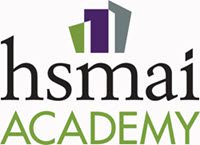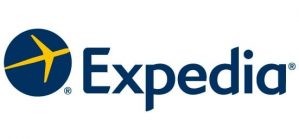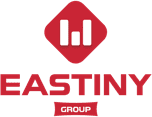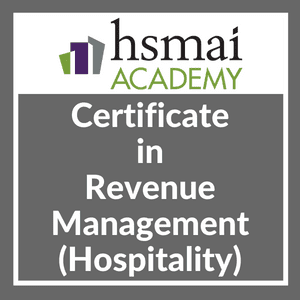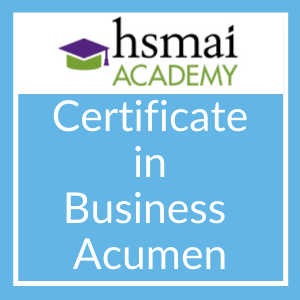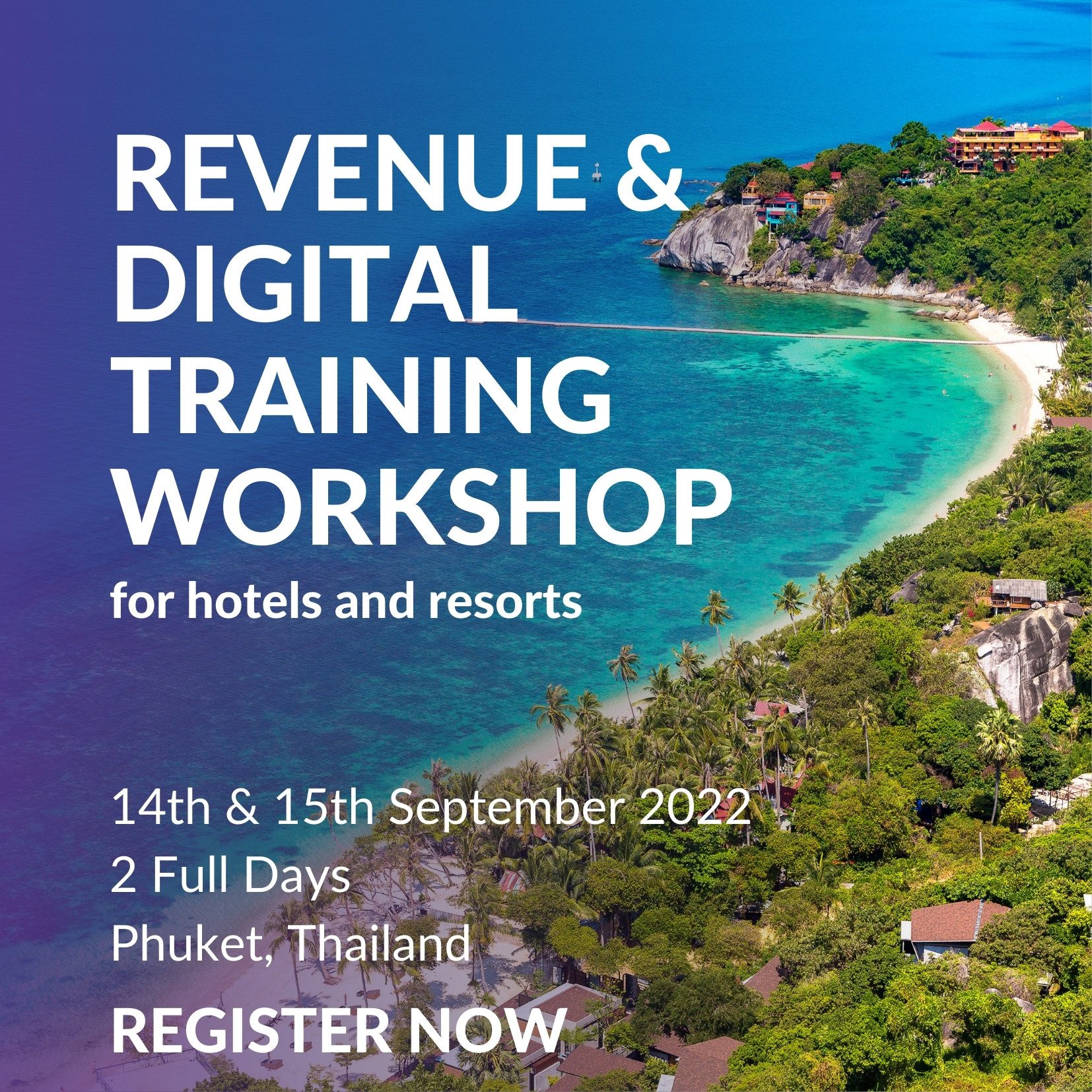
Hospitality Sales & Marketing Association International have developed a full training program for hotels & accommodation businesses and people looking to grow their careers in revenue management. 100% Online courses and some optional face-to-face workshops.
STUDY ANYWHERE, ANYTIME
DEVELOPED BY HOTELIERS
HANDS ON
Who Should Earn This Certificate
- People just starting in the revenue department
- Hotel staff who would like to move into a revenue role
- Hospitality students who want the industry’s perspective on revenue management
- Commercial professionals wishing to formalise their revenue management knowledge with a certificate course
- Commercial professionals wanting to learn more about the role of the revenue department in the hotel industry
Course Pricing
- HSMAI Members pay only US$400 for the 10-course program, a saving of US$150
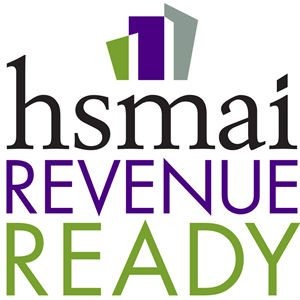 Non-members pay only US$550 for the 10-course program
Non-members pay only US$550 for the 10-course program
Once you sign up, the course materials are available to you for 12 months. Upon completion of the course, you will earn a Certificate in Revenue Management.
Program Content
The fundamental components of revenue management are applied to any business that has fixed capacity, perishable inventory, and time-variable demand. This course introduces you to the elements of revenue management that you need to be familiar with to understand the role of revenue in the accommodation industry. It’s not just about pricing. The discipline involves many skills and this initial course will introduce you to each one.
You will learn:
- The main elements of the function of revenue management
- Understand revenue management terms and definitions
- To identify a revenue management career path
Research from Cornell University used-eye tracking software and interviews to analyse how consumers make their accommodation decisions, and the process involved. The results found that — far more than price — imagery is a critical component. One of the study’s authors, Stephani K. A. Robson said: “What guests appear to be thinking about is how well all the pieces of information about the hotel—price, brand, photo, ratings, and so on — fit together. They used pictures to imagine themselves at the property and to see if the hotel was the right ‘fit’ for them, so images that provide some sense of the experience, not just what the hotel looks like from the outside, may be powerful, perhaps even more than reviews or ratings which get a lot of attention from the industry.”
Hoteliers need to learn how to influence consumers to book their hotels instead of other properties. To do this, you’ll need an understanding of the customer journey — for holiday-makers, business people, and meeting planners.
You will learn:
- How customers shop for accommodations
- What drives the customer search and selection process
- What influences customers’ choices during search (including travel agents)
- The customer journey — from dreaming about a trip to shopping, booking, and experiencing the trip
- How meeting planners decide on a venue
- What hotel loyalty programs are, how they influence guests’ selection of accommodation, how they drive additional revenue for hotels, and how revenue managers leverage the benefits of hotel loyalty programs
In this course you’ll learn the basics of economics and the role it plays in the revenue management function. Learning how to identify your competitors, benchmark your property against theirs, and how to win more business from them is a big part of the revenue role. Learn how to read competitor reports and gain insights from them that you can action to improve your profits.
You will learn:
- The fundamental principles of economics and their role in hotel revenue management
- How revenue directors monitor and measure their competitor marketplaces
- How hotel managers identify true competitor properties
- How to read competitor reports and use other data to derive strategic insights to make better decisions
Most industries categorise their market into different segments to understand them better, and to customise their product to each segment. This is a fundamental way to increase revenue to your business. As a revenue analyst, you need to know what these segments are and how to use that knowledge to win business from your competitors.
You will learn:
- What segmentation is
- Why hotels segment their markets
- How to define each segment (e.g., corporate, events, wholesale, retail, etc.)
- The difference between a channel and a segment
- How to use segmentation to gain insights and improve bottom line results
- How consumer behaviours differ by channel
- The terms and strategies around using segments versus channels versus personalised offers
This course covers the landscape and management of accommodation distribution and explains the role of distribution costs in a revenue strategy. Growth in digital travel shopping has provided many additional competitive options for consumers, which provides hotels with many more potential sources of revenue. This course is a starting point for any member of the hotel community to better understand distribution dynamics and their impact on hotel profitability.
This course was developed by the HSMAI Revenue Advisory Board with the kind support of SiteMinder, one of the industry’s leading experts in distribution.
You will learn:
- The definition of “distribution” within the accommodation sector
- The definition of “accommodation inventory” and how it is managed
- The types of distribution channels
- The factors that go into computing the “cost of sale”
- The steps to implementing a successful distribution strategy
- The important role of technology in a distribution strategy
- The definition of “rate parity” and its role in distribution
- About the basics of digital distribution
Hotel rooms are perishable goods with a shelf life of one day, so it is important for hoteliers to maximise their value. The clearer the picture you have of demand, the better you can prepare accordingly in many phases of operation, from staffing to marketing to pricing. Forecasting demand for your rooms allows you to identify needs and build a strategy based on projected occupancy. Forecasting is a complex discipline and can be overwhelming at first, and it can be easy to learn when broken down into simple steps.
With an accurate forecast, hotel management will have a good understanding of their performance goals in terms of occupancy, rate, and overall rooms revenue. For example, if a popular event in the area brings a number of new guests to the door, forecasting helps hoteliers understand how to set prices to maximise revenue. In addition, your forecast will determine when it is necessary to lower rates to boost occupancy on days with lower demand. Simply put: A forecast is a tool used to run a hotel more effectively and profitably.
You will learn:
- The different types of forecasts
- The objectives for each forecast type
- The elements of an accurate forecast
- What information you need to put a forecast together (and how to find it)
- The questions you should ask when putting together a forecast
- How often you should adjust forecasts
- The steps to follow to put the forecast together
- The difference between unconstrained and constrained demand
A revenue strategy is critical to the success of a hotel’s revenue management philosophy. A revenue strategy allows the entire revenue team to discuss, strategise, and understand what the goals are for the hotel, and how to work towards these goals. This course provides examples of good strategies and how the revenue team members should use the strategy to make decisions.
You will learn:
- The components of a good revenue strategy
- What differentiates various revenue strategies
- What pricing strategy is
- How to use the revenue strategy to manage day-to-day tactics (exercises included)
- About inventory control and how inventory can impact sales
Pricing strategies allow hotels to charge different room rates for the same or similar rooms according to customers’ characteristics and needs. For example, a senior citizen traveller looking for a seniors discount has different needs, different characteristics, and a different willingness to pay than a corporate traveller has. As a result they may book the exact same room but pay a much different price. Along with the different price may be certain booking requirements or unique restrictions.
Once market segments are defined for a hotel, it is up to the revenue director — along with the director of sales — to ensure a healthy segmentation mix. This is a key component to optimising a hotel’s pricing strategy and approach. Since hoteliers offer multiple rates for essentially the same room type it is critical to understand the importance of pricing and all it encompasses. This course explores strategic pricing and various pricing-related elements.
You will learn:
- The influences on pricing including lead time, and decoy and anchor pricing
- How to price your different room types
- The difference between tactical versus strategic pricing
- The what and why of different types of pricing (BAR, Rack, Group, Corporate, Event, Mobile-only, Opaque, Length-of-Stay, etc.)
- How to work with wholesalers when it comes to static versus dynamic rates
- The role of loyalty clubs and closed-user-group rates
- The impact of discounting including how to calculate occupancy needed to offset discounts
- How to conduct a displacement analysis
- What technology is available to monitor and manage pricing
You will learn:
- The types of reports that revenue managers create
- From where different types of data are available
- How to read and gain insights from data and reports
- How to present data in easily understood formats
It is important for everyone in the hotel to understand the role of the revenue director, and what a typical day in the job entails. Learn about the role of the revenue department, how cross-functional revenue meetings are managed, and how the department fits into the organisation at the property and corporate levels.
Additionally, there is no organisational structure that can work in all hotel environments, cultures or companies. The organisational structure that works best for each hotel or company will strongly depend on four key elements which will be explained in this course.
You will learn:
- The different types of revenue management organizational structures and the benefits and challenges of each
- The key elements that influence how revenue management integrates into a hotel organisation
- Why company culture is key to being successful in revenue roles
- The responsibilities that revenue staff perform
- The importance of the revenue meeting and how it contributes to the success of the business
